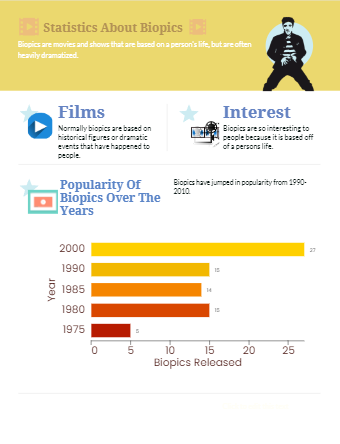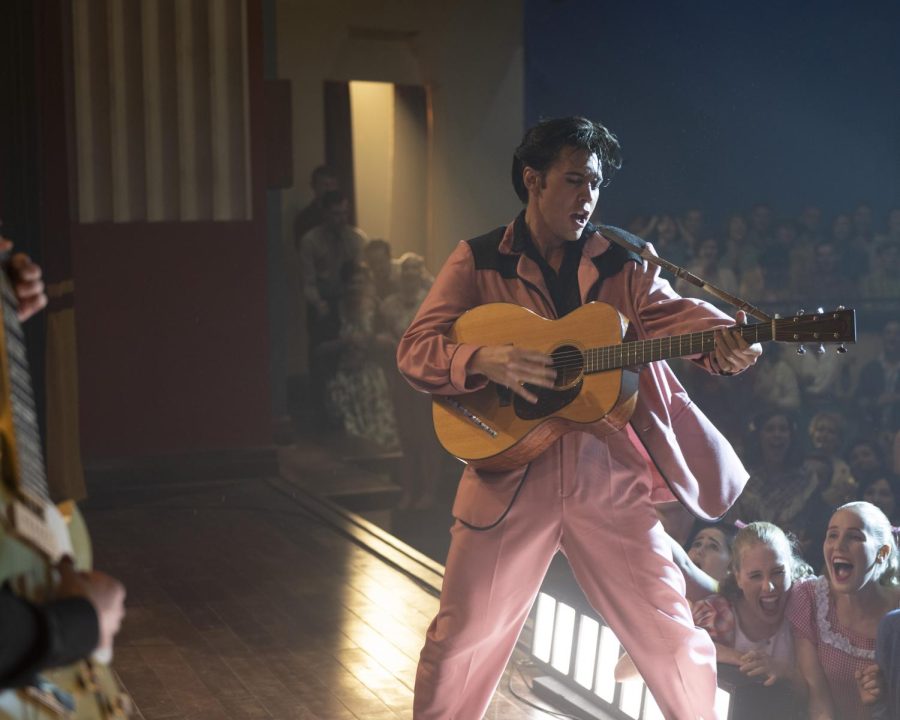[Multimedia] Film industry trends reveal rise in biopics
Tribune News Service
Austin Butler is nominated for a lead actor Oscar for his portrayal of Elvis Presley in Baz Luhrmann’s movie “Elvis.” Permission from Courtesy Warner Bros. Pictures/TNS
February 12, 2023
Biopics are no new fascination of the film industry, yet recent years have been a testament to just how highly valued they are within Hollywood. The word biopic is short for biographical motion picture, which is a movie that dramatizes the life of a public or historical figure. Beginning in the late 20th century, there has been a resurgence of such films, with especially large numbers having been released in the past few years and many more set to come out in the near future.
Biopics have been around since the days of silent cinema, an era which began in the 1890s, when movies were first invented and they contained neither voices nor music. Throughout the next century they continued to be produced, gaining recognition as a genre in the 1930s and becoming truly popular in the 1990s, during which there was a significant influx created. Films such as ‘Goodfellas,’ ‘Girl, Interrupted,’ ‘Schindler’s List’ and ‘Malcolm X,’ all acclaimed and well-known biopics, are a product of that decade.
Moving into the 2000s and 2010s, audiences have seen some of the most notable biopics yet, namely ‘Bohemian Rhapsody,’ ‘The Wolf on Wall Street,’ ‘Rocketman’ and ‘The Social Network.’ Yet, with all that have been released, the surge shows no signs of slowing down. In fact, it looks to be doing the opposite entirely.
Hollywood’s fondness of the genre seems to be at an all-time high, however, it has proved difficult to pinpoint a sole reason for the industry’s penchant for them. The genre certainly generates the interest of Hollywood’s biggest stars, with many of the movies featuring an ensemble cast. One reason for this attraction may be the fact that biopics are notorious for their Oscar wins and nominations. The prestige and power that comes with winning an Oscar is undeniable and movie studio chiefs, actors and actresses alike recognize this and use it to their advantage.
Another reason biopics may attract such revered stars, is their interest in telling stories about the things they know. Often biopics center on a public figure whom actors can easily resonate with, if not for anything else than the effects and weight of such massive amounts of fame. They can relate to the struggles, especially within the industry, that the celebrity their depicting face and most likely feel that there is some element of the figure’s character that an audience will resonate with as well. After all, biopics tell real stories about real people.
Another culprit for the increase in biographical films is financial success and safety. Film executives want definite and instant hits, a difficult task to achieve in the highly competitive industry. It is this market logic that explains the abundance of superhero films as well as biopics. These types of films are known to attract an audience and telling the story of a celebrity or public figure gives studios the additional advantage of name recognition when attempting to entice viewers.
Biopics are also often produced on limited budgets. Investing money into a film is a substantial risk and a few big budget failures can leave a studio on the verge of bankruptcy. Therefore, incorporating the production and releases of smaller budgeted films amidst the stream of larger ones, helps to lessen the risk factor significantly.
Music biopics in particular, have become a quintessential part of the industry, as they prove to be audience favorites time and time again. This is yet another asset to movie studios, as they are the ones who own the record companies that distribute the songs in the film. One example of this is ‘Bohemian Rhapsody,’ which has a soundtrack brimming with Queen songs. The rights to their songs are owned by Hollywood Records, which is owned by Disney. Moreover, Disney also owns Regency and 20th Century Studios, the two companies that produced the film.
Furthermore, despite their popularity, many people have begun to argue that biopics of late are more the result of a lack of creativity within Hollywood than anything else. They claim that instead of coming up with fresh, new content, studios have defaulted on telling pre-existing stories, enforcing the claim of their deficiency in originality.
In continuation, as an unfortunate result of unoriginality and the constant stream of biopics being released, many have begun to seem one and the same. Audiences find that Hollywood has even made real stories, specific to an individual, seem cliche. Narratives that should be distinct from one another are being produced in a way that makes them feel redundant to viewers, rather than refreshing and genuine.
However, redundancy is not the only downfall of biopics. It has become more and more apparent in recent years that biopics often exploit the figures they’re portraying. Directors are not looking for their story to tell the truth, but to play into aesthetics. Therefore, celebrity’s narratives are being altered, dramatized and capitalized on, instead of accurately displayed.

Once again, the Queen biopic ‘Bohemian Rhapsody,’ serves as a prime example of this phenomenon. The film is constantly criticized for its depiction of Freddie Mercury’s sexuality and how it reduces it to a series of promiscuous acts, that are then framed as shameful and corrupting. The film is repeatedly condemned for making its center a queer man whilst trying to detach from and undermine that side of his identity. It even sped up Mercury’s AIDS diagnosis by two years, placing it before the Live Aid concert, a decision many view as problematic. They believe that the diagnosis was made out to be a consequence of indulging his sexuality and was used for dramatic effect, diminishing its depth and magnitude.
Additionally, the recent film ‘Elvis,’ is criticized for similar reasons. This movie is often said to have romanticized Elvis’ image, focusing on the aesthetics of 1950s rock-n-roll, while neglecting reality and his flaws. For instance, the movie features a scene of Elvis and his love interest, Priscilla’s, first kiss, failing to acknowledge the fact that at the time Elvis had been 24 and Priscilla only 14.
Finally, the recent Marilyn Monroe movie ‘Blonde,’ serves as a further example of such exploitation. While the movie is not necessarily a biopic, being an adaptation of a book that fictionalized her life, the media has incessantly referred to it as one. Therefore, many people go into it with the implication that it is. Regardless, the denunciations of the film still apply. It is a frequent criticism that the many hardships Monroe endured during her lifetime, were reduced to a part of her sexual allure and public image, rather than portrayed in a way that humanized her.
Nevertheless, current controversies have not impacted the frequency at which biopics are produced. In the near future audiences can expect films such as ‘Going Electric,’ starring Timothee Chalamet as Bob Dylan, ‘Oppenheimer,’ with Cillian Murphy leading a star-studded cast, and ‘Weird: The Al Yankovic Story,’ starring Daniel Radcliffe, among others. With these and many more already in the works, audiences are hoping that Hollywood is able to break away from past trends, in order to do justice to those whose story they have taken it upon themselves to tell














